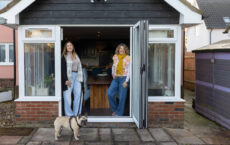Buying your first home is an exciting time and a huge milestone in anyone’s life. But the idea of building up a deposit may fill many people with dread and just knowing where to begin can be a challenge. That’s why we’ve put together this guide to help you reach the first rung on the property ladder.
Getting started with saving for a mortgage deposit
It might seem like an obvious place to start, but first you need to figure out exactly how much you’ll need to save. There are mortgages available with deposits as little as 5%, but you may be paying more to borrow the money than you would if you can save up a larger deposit. Generally the more deposit you have, the more competitive mortgage deals you’ll be able to access.
Don’t forget to include additional costs associated with house buying, such as stamp duty, survey costs and allow a suitable margin for furniture or cosmetic DIY jobs once you move in. You then need to decide how much you can afford to save each month in order to reach your target, and stick to it – but make it realistic.
Taking a ‘no more and no less’ approach can be really useful. To do this, make a promise to yourself to never fall short of your target, but on the other hand, if you’ve managed to save a bit more during on particular month, treat yourself to something exciting. Saving for a deposit can be a long slog, so it’s important to make sure there are lots of enjoyable moments along the way, otherwise you may find yourself throwing in the towel.
Neaten up your accounts
Get into the habit of ‘rounding off’ the amount in your bank account. Simply find out how much you have left in your current account and transfer an amount in to your savings account to leave a nice round number e.g. if you have £548.50 in your current account, move £48.50 across to your savings account . It takes just two minutes, but do this a couple of times a month and you’ll be amazed by how much will accumulate.
Get shot of pricey coffee
A recent study from UBS on what ‘millennial must-haves cost around the world’ found the average price of a UK cup of coffee to be £2.98 ($3.88). It’s an oft-used example that a takeaway latte on your commute to work may seem harmless, but do that every day and that’s £15 a week and over £750 a year – just on coffee!
Try cutting out your usual coffee shop visit and taking a travel mug from home instead. Without all those disposable cups, you’ll be saving the environment as well as your hard-earned cash.
If you do find yourself craving that familiar cardboard cup in your hand each morning, all is not lost. You can pick up your own batch of disposable cups and holders easily from a growing number of online retailers and discount stores. It’ll look and feel just like the real thing, but at a fraction of the price.
Be savvy with your food shop
If you’re already living independently, perhaps renting a room or a property, you’ll be familiar with the perils of supermarket shopping. Cut down on your food bills by creating a meal plan for the week ahead so that when it comes to writing your shopping list, you’ll know exactly what you need and won’t be tempted to pick up surplus items. It’s also helpful to get into the habit of checking the cupboards as you write your list to make sure you’re not buying ingredients you already have in stock. That way by the end of the week you won’t be throwing wasted food – and money – in the bin.
Shopping on an empty stomach will make you more likely to pick up snacks you don’t really need, so try and time your shop for when you know you won’t be feeling hungry to avoid unnecessary purchases too.
Keep the takeaways at bay
Always have a ‘cheat meal’ in the freezer, something that you can simply defrost and enjoy with minimal effort. This will help you resist the temptation to just order a takeaway on those days when you just can’t face cooking!
Moving back home
If you’re considering moving back in with your parents to help fast-track your savings, you wouldn’t be alone. According to the Office for National Statistics, more than a quarter of people aged 20 to 34 are still living at home, a record figure.
For most people who’ve already flown the nest, this idea can be a step too far but if you set some ground rules, this is a sure fire way to get your deposit savings off to a flying start.
Houses of Multiple Occupancy (HMOs)
If moving back home simply isn’t an option or you’d prefer to keep your independence, why not look into a House of Multiple Occupancy (HMO) – or as they’re more widely known – a houseshare? With this type of contract, bills and council tax are normally included, rent is much cheaper than leasing an entire property and you’ll meet new people to hang out with, dampening the blow to your social life due to your spending restrictions.
HMOs are becoming increasingly popular amongst young professionals, and therefore many landlords provide additional amenities such as free broadband, satellite television and laundry facilities, all luxuries you might not be able to afford if renting privately.
Where to go next
Even if you’re a little way off getting your required deposit together, it’s not too early to start researching the mortgage market to see which type of deal might suit you best.
At Ipswich Building Society we offer free, no-obligation mortgage advice through our team of Mortgage Consultants. If you’re looking for a mortgage with us we’ll do our best to find the right one for you. And what’s more, all of our applications are manually underwritten by our in-house team of experts – perfect for first time buyers or those with unusual circumstances looking for some added flexibility.
Once you’re ready to start, give us a call on 0330 123 0723 or send us a message and we’ll be in touch to help you achieve your dream first property.


















